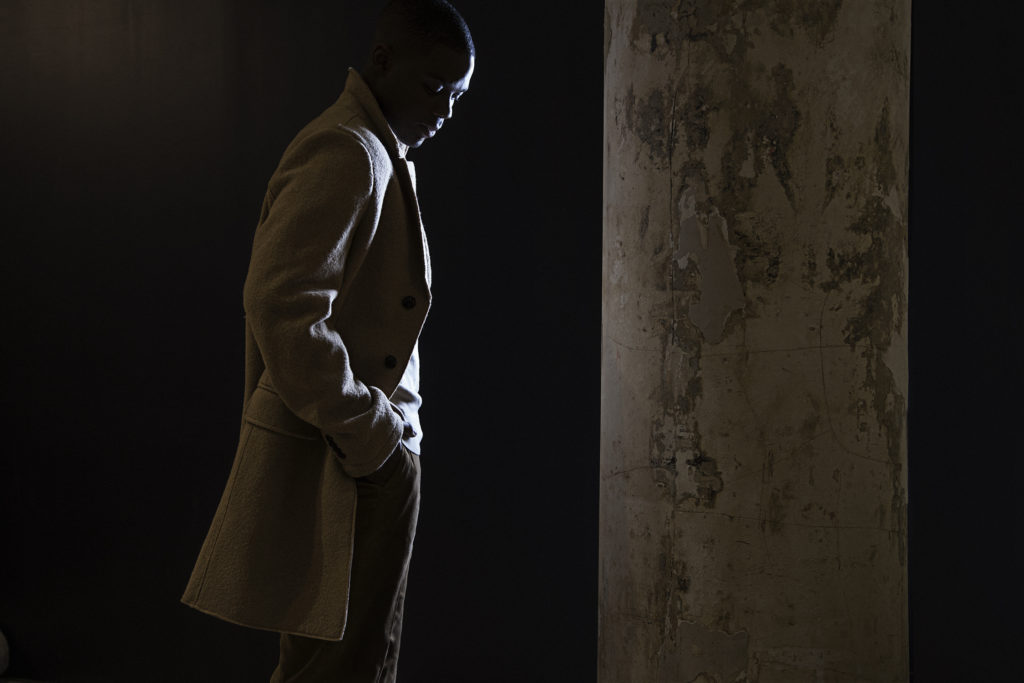As the limelight careens his way, Jovan Adepo—lighthearted as he is—tightens his grip on the principles that got him here: Hard work comes first. The sparkly stuff, like accolades, elbow-rubbing galas, and on-the-street recognition, is all a privilege; it’s secondary to the work.
Adepo’s morals echo the obligation-versus-desire thread at the heart of Fences. In Denzel Washington’s film adaptation of August Wilson’s play, Adepo stars as Cory, the son of Troy and Rose (Washington and Viola Davis). Troy’s worth comes from loyalties—namely that to his family—and believes that responsibilities keep one from falling prey to aimless distractions. He preaches this to Cory, who wants to pursue a football scholarship. Dad thinks it’s frivolity. Mom thinks it’s harmless fun. Adepo plays rope in a tug-of-war match between the two silver-screen steamrollers; his storyline foreshadows an explosive revelation that threatens his parents’ hard-earned stasis.

Jovan Adepo photographed by Rick Day & Steve Benisty, Styling by Mike Stallings, Grooming by Tiffany Nicole; Top Coat: Ralph Lauren
Prior to Fences, Adepo’s only notable credit was a series regular on HBO’s The Leftovers. However, his next film might be even bigger than Fences: He stars in Darren Aronofsky’s untitled film, joining Jennifer Lawrence, Michelle Pfeiffer, Javier Bardem, and Ed Harris. It’s a meteoric rise from no-name to A-List, one that rightfully has Adepo grappling with his obligations. Like Fences’ Cory, however, his own parents have instilled in him a certain set of values (if less dramatically) to retain balance.
“My mom and dad have reminded me to stay focused, to remember why I chose to pursue art,” he says, reflecting on the five years spent with very few audition callbacks. “There’s a reason we get in the business. Of course it’s fun to go on the press tours and meet all these people. But that’s noise. It’s extra stuff. I can enjoy the things that come as a byproduct, but the focus is the work. For some people, the call never comes. I can’t take it for granted.”
When Adepo moved to LA after college, he contacted a fellow churchgoer, Diane, from back home in Maryland. She had seen him in the church’s Easter production a few years earlier, and encouraged him to pursue acting fulltime. She even volunteered to connect him to her sister: “All she had said was ‘My sister works in the business.’ That’s all I knew,” Adepo says. Nevertheless, he needed guidance navigating Hollywood, so he asked Diane for an introduction. As it would turn out, Diane is the oldest sister of one Viola Davis. And luckily, Davis agreed to meet with Adepo, to give him some starting-out advice.
“Viola and her husband were the ones who told me what I needed to study,” Adepo says. “Like, ‘Forget being famous and wanting to be a star; you need to work on your craft. Study theatre, study everything.’ I respect and relish in the fact that they pointed me in the direction I needed to go.
“But it was like a mother bird encouraging the baby out of the nest: You gotta flap your wings or else you’ll hit the ground. She said, ‘Maybe if you’re good we’ll get to work together.’ She by no means handed me anything.”
It was a few years before anything panned out—before his break came with The Leftovers. And, after Washington saw Adepo’s audition tape for Fences, everything materialized. Davis and Adepo would get to collaborate after all, and in a major way (alongside Washington, no less).
On set, the two stars taught Adepo another major lesson; this time it came by example.
“The emotional scene between Troy and Rose that you see in the trailer, that was a particularly difficult day,” says Adepo. “All day, they are just filming that one scene, with different camera angles. Since her part is so intense, Viola grew very exhausted. But she worked through it, and just blasted it. There wasn’t a clear eye on set. It’s uncomfortable subject matter, but they handled it beautifully and professionally.
“[Denzel and Viola both] showed me that the learning doesn’t stop. At that level, the people who are the elites of this industry are taking a lot of time to explore their characters, and to take roles that challenge them.”
Score one for principles.
written by Adam Hurly



